University Report: Healthcare Narrative of an Indigenous Australian
VerifiedAdded on 2023/04/07
|6
|1484
|372
Report
AI Summary
This report examines the health journey of Joe Williams, a former Australian rugby player and boxer, as a case study to understand the health challenges faced by Indigenous Australians. It highlights the increased prevalence of mental health issues, such as depression and bipolar disorder, substance abuse, and their interconnectedness with factors like cultural marginalization, racism, and personal trauma. The narrative explores the impact of these health problems on individuals, families, and the broader community, including financial burdens, limited access to treatment, and the strain on family caregivers. The report also discusses the role of cultural identity and community support in recovery and emphasizes the need for increased awareness and resources to address these health disparities. The report concludes by reiterating the importance of addressing the mental, physical, and social well-being of Indigenous Australians and the impact of chronic illnesses on their lives.
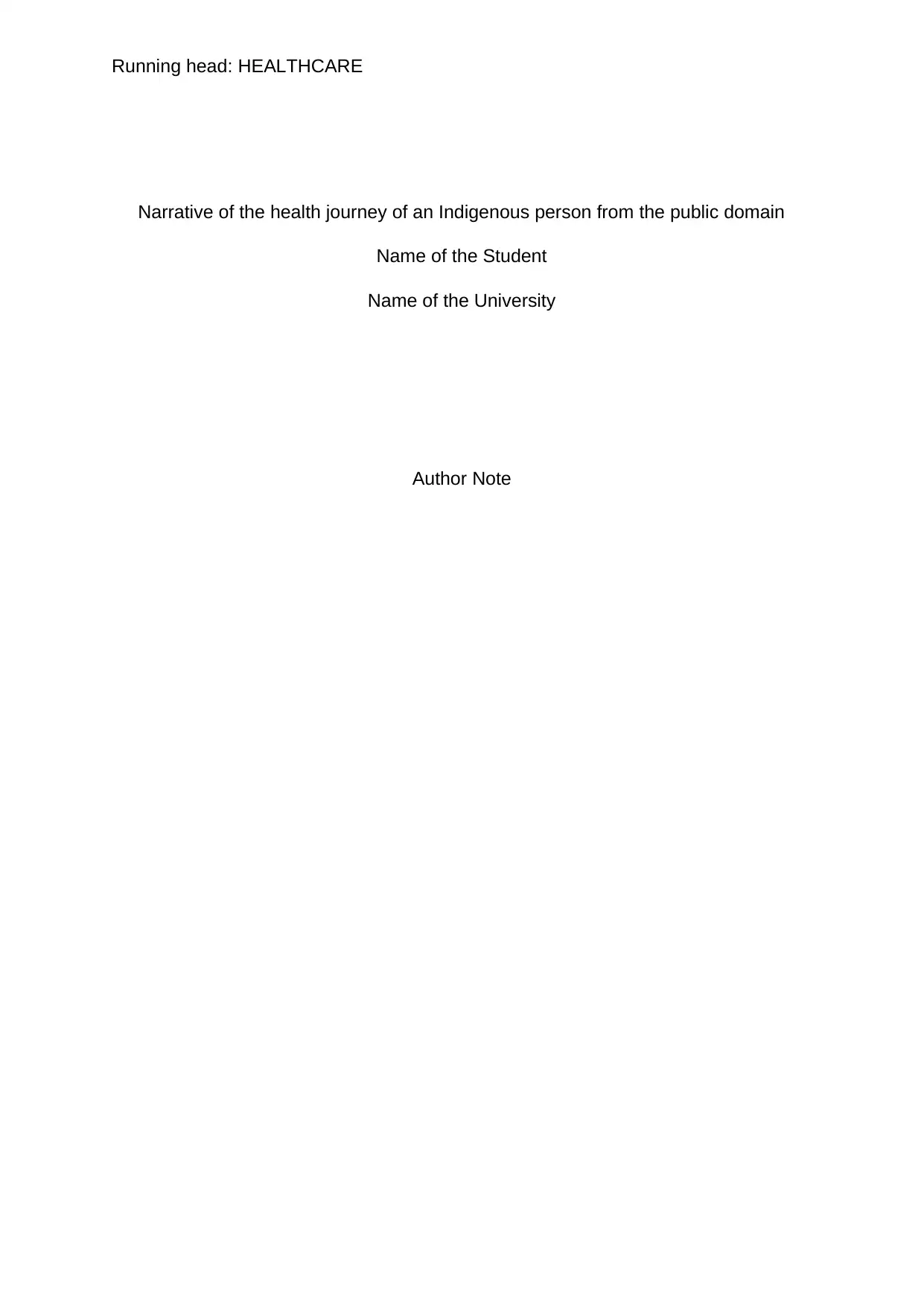
Running head: HEALTHCARE
Narrative of the health journey of an Indigenous person from the public domain
Name of the Student
Name of the University
Author Note
Narrative of the health journey of an Indigenous person from the public domain
Name of the Student
Name of the University
Author Note
Paraphrase This Document
Need a fresh take? Get an instant paraphrase of this document with our AI Paraphraser

1HEALTHCARE
Introduction- There is mounting evidence for the fact that the health and
wellbeing status of Aboriginal Australians is less, when compared to their non-
indigenous counterparts. Indigenous Australian often report more prevalence of
diabetes, chronic renal disease, cardiovascular problems, mental illness, and
respiratory diseases (Panaretto, Wenitong, Button & Ring, 2014). In addition,
tobacco use, alcohol consumption, and substance abuse are widespread among
indigenous Australians. This narrative will discuss about the health journey of Joe
Williams, former rugby player, and will also elaborate on the effects that health
issues can create on the lifestyle of a person.
Narrative- Joe Williams is an Australian who had been a professional boxer
and an Australian rugby player. His career spanned from 2004-2008. He was born to
Wilfred Williams, who played for several Sydney teams during the 80s. He is
commonly referred to as a 1st Nations Aboriginal man, who was born in Cowra, and
raised in the region of Wagga Wagga, located in New South Wales. His tryst with the
game began at the age of 13, when he became a renowned rugby league star, and
began playing for the South Sydney Rabbitohs, while finishing school (Whitehouse,
2018). The teenage years marked the onset of depression, which was concealed
from others, with the fear of being stigmatised. His situation further worsened after
suffering a concussion that increased the severity of the episodes, which made him
seek refuge in drugs and alcohol. He soon became and addict and lost his zeal for
playing sports. Following a failed suicide attempt, Williams realised the need of
increasing awareness among people on mental illness and authored his
autobiography “Defying the Enemy Within”, and also began working for suicide
prevention (Joewilliams.com.au, 2018).
Reports from the Australian Aboriginal and Torres Strait Islander Health
Survey (AATSIHS) provides evidence for the fact that an estimated 1/3 indigenous
adults experience high levels of psychological distress that encompasses depression
(Australian Bureau of Statistics, 2016). This can be accredited to the fact that the
Aboriginals often feel that they have been marginalised and are present at the
periphery of the community (Parker & Milroy, 2014). In addition, suicides have also
become gradually predominant in recent decades among indigenous people. The
interconnected concerns of personal trauma, cultural dislocation, racism,
estrangement and exclusion from society largely contribute to the high prevalence
NAME STUDENT ID
Introduction- There is mounting evidence for the fact that the health and
wellbeing status of Aboriginal Australians is less, when compared to their non-
indigenous counterparts. Indigenous Australian often report more prevalence of
diabetes, chronic renal disease, cardiovascular problems, mental illness, and
respiratory diseases (Panaretto, Wenitong, Button & Ring, 2014). In addition,
tobacco use, alcohol consumption, and substance abuse are widespread among
indigenous Australians. This narrative will discuss about the health journey of Joe
Williams, former rugby player, and will also elaborate on the effects that health
issues can create on the lifestyle of a person.
Narrative- Joe Williams is an Australian who had been a professional boxer
and an Australian rugby player. His career spanned from 2004-2008. He was born to
Wilfred Williams, who played for several Sydney teams during the 80s. He is
commonly referred to as a 1st Nations Aboriginal man, who was born in Cowra, and
raised in the region of Wagga Wagga, located in New South Wales. His tryst with the
game began at the age of 13, when he became a renowned rugby league star, and
began playing for the South Sydney Rabbitohs, while finishing school (Whitehouse,
2018). The teenage years marked the onset of depression, which was concealed
from others, with the fear of being stigmatised. His situation further worsened after
suffering a concussion that increased the severity of the episodes, which made him
seek refuge in drugs and alcohol. He soon became and addict and lost his zeal for
playing sports. Following a failed suicide attempt, Williams realised the need of
increasing awareness among people on mental illness and authored his
autobiography “Defying the Enemy Within”, and also began working for suicide
prevention (Joewilliams.com.au, 2018).
Reports from the Australian Aboriginal and Torres Strait Islander Health
Survey (AATSIHS) provides evidence for the fact that an estimated 1/3 indigenous
adults experience high levels of psychological distress that encompasses depression
(Australian Bureau of Statistics, 2016). This can be accredited to the fact that the
Aboriginals often feel that they have been marginalised and are present at the
periphery of the community (Parker & Milroy, 2014). In addition, suicides have also
become gradually predominant in recent decades among indigenous people. The
interconnected concerns of personal trauma, cultural dislocation, racism,
estrangement and exclusion from society largely contribute to the high prevalence
NAME STUDENT ID
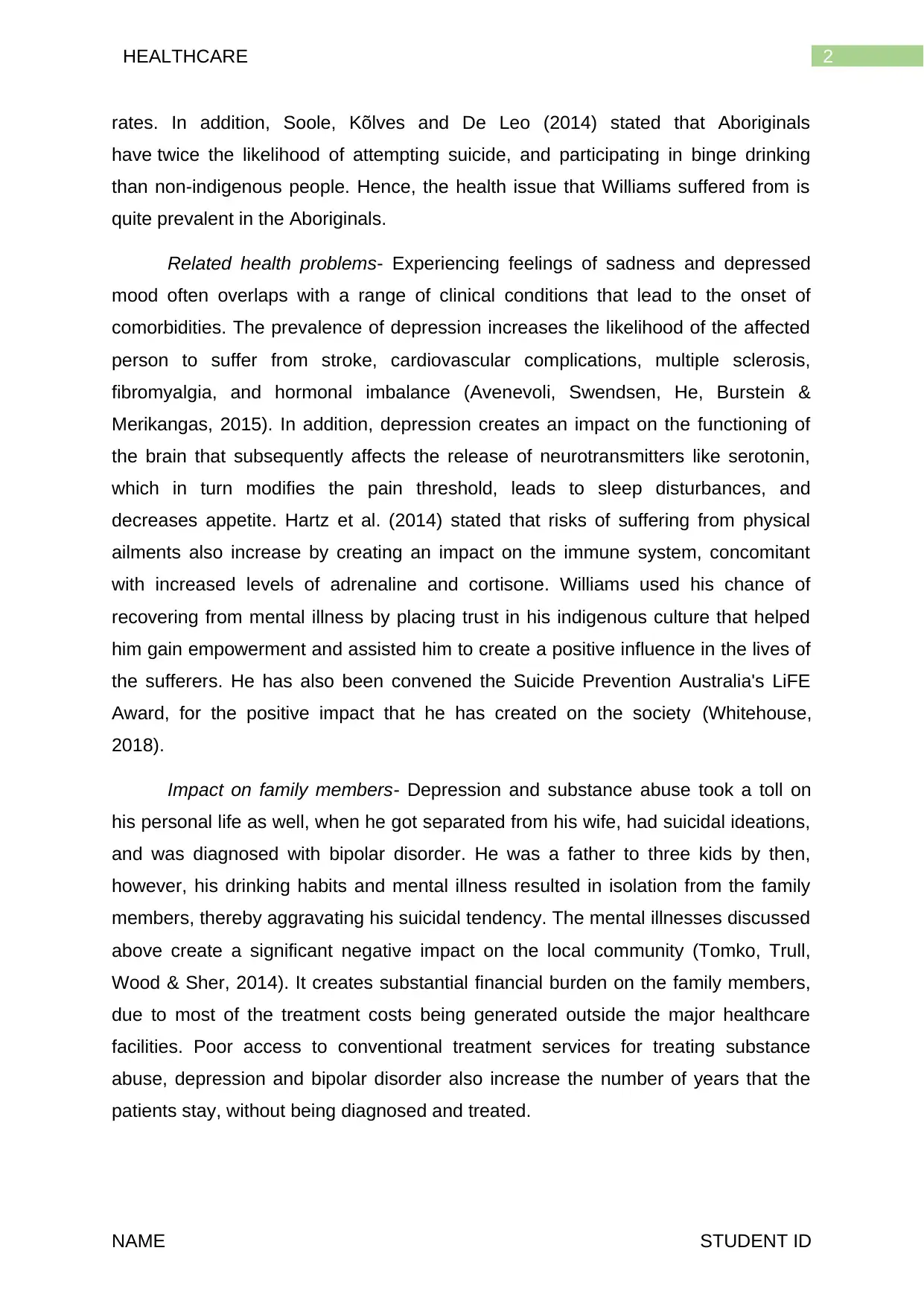
2HEALTHCARE
rates. In addition, Soole, Kõlves and De Leo (2014) stated that Aboriginals
have twice the likelihood of attempting suicide, and participating in binge drinking
than non-indigenous people. Hence, the health issue that Williams suffered from is
quite prevalent in the Aboriginals.
Related health problems- Experiencing feelings of sadness and depressed
mood often overlaps with a range of clinical conditions that lead to the onset of
comorbidities. The prevalence of depression increases the likelihood of the affected
person to suffer from stroke, cardiovascular complications, multiple sclerosis,
fibromyalgia, and hormonal imbalance (Avenevoli, Swendsen, He, Burstein &
Merikangas, 2015). In addition, depression creates an impact on the functioning of
the brain that subsequently affects the release of neurotransmitters like serotonin,
which in turn modifies the pain threshold, leads to sleep disturbances, and
decreases appetite. Hartz et al. (2014) stated that risks of suffering from physical
ailments also increase by creating an impact on the immune system, concomitant
with increased levels of adrenaline and cortisone. Williams used his chance of
recovering from mental illness by placing trust in his indigenous culture that helped
him gain empowerment and assisted him to create a positive influence in the lives of
the sufferers. He has also been convened the Suicide Prevention Australia's LiFE
Award, for the positive impact that he has created on the society (Whitehouse,
2018).
Impact on family members- Depression and substance abuse took a toll on
his personal life as well, when he got separated from his wife, had suicidal ideations,
and was diagnosed with bipolar disorder. He was a father to three kids by then,
however, his drinking habits and mental illness resulted in isolation from the family
members, thereby aggravating his suicidal tendency. The mental illnesses discussed
above create a significant negative impact on the local community (Tomko, Trull,
Wood & Sher, 2014). It creates substantial financial burden on the family members,
due to most of the treatment costs being generated outside the major healthcare
facilities. Poor access to conventional treatment services for treating substance
abuse, depression and bipolar disorder also increase the number of years that the
patients stay, without being diagnosed and treated.
NAME STUDENT ID
rates. In addition, Soole, Kõlves and De Leo (2014) stated that Aboriginals
have twice the likelihood of attempting suicide, and participating in binge drinking
than non-indigenous people. Hence, the health issue that Williams suffered from is
quite prevalent in the Aboriginals.
Related health problems- Experiencing feelings of sadness and depressed
mood often overlaps with a range of clinical conditions that lead to the onset of
comorbidities. The prevalence of depression increases the likelihood of the affected
person to suffer from stroke, cardiovascular complications, multiple sclerosis,
fibromyalgia, and hormonal imbalance (Avenevoli, Swendsen, He, Burstein &
Merikangas, 2015). In addition, depression creates an impact on the functioning of
the brain that subsequently affects the release of neurotransmitters like serotonin,
which in turn modifies the pain threshold, leads to sleep disturbances, and
decreases appetite. Hartz et al. (2014) stated that risks of suffering from physical
ailments also increase by creating an impact on the immune system, concomitant
with increased levels of adrenaline and cortisone. Williams used his chance of
recovering from mental illness by placing trust in his indigenous culture that helped
him gain empowerment and assisted him to create a positive influence in the lives of
the sufferers. He has also been convened the Suicide Prevention Australia's LiFE
Award, for the positive impact that he has created on the society (Whitehouse,
2018).
Impact on family members- Depression and substance abuse took a toll on
his personal life as well, when he got separated from his wife, had suicidal ideations,
and was diagnosed with bipolar disorder. He was a father to three kids by then,
however, his drinking habits and mental illness resulted in isolation from the family
members, thereby aggravating his suicidal tendency. The mental illnesses discussed
above create a significant negative impact on the local community (Tomko, Trull,
Wood & Sher, 2014). It creates substantial financial burden on the family members,
due to most of the treatment costs being generated outside the major healthcare
facilities. Poor access to conventional treatment services for treating substance
abuse, depression and bipolar disorder also increase the number of years that the
patients stay, without being diagnosed and treated.
NAME STUDENT ID
⊘ This is a preview!⊘
Do you want full access?
Subscribe today to unlock all pages.

Trusted by 1+ million students worldwide
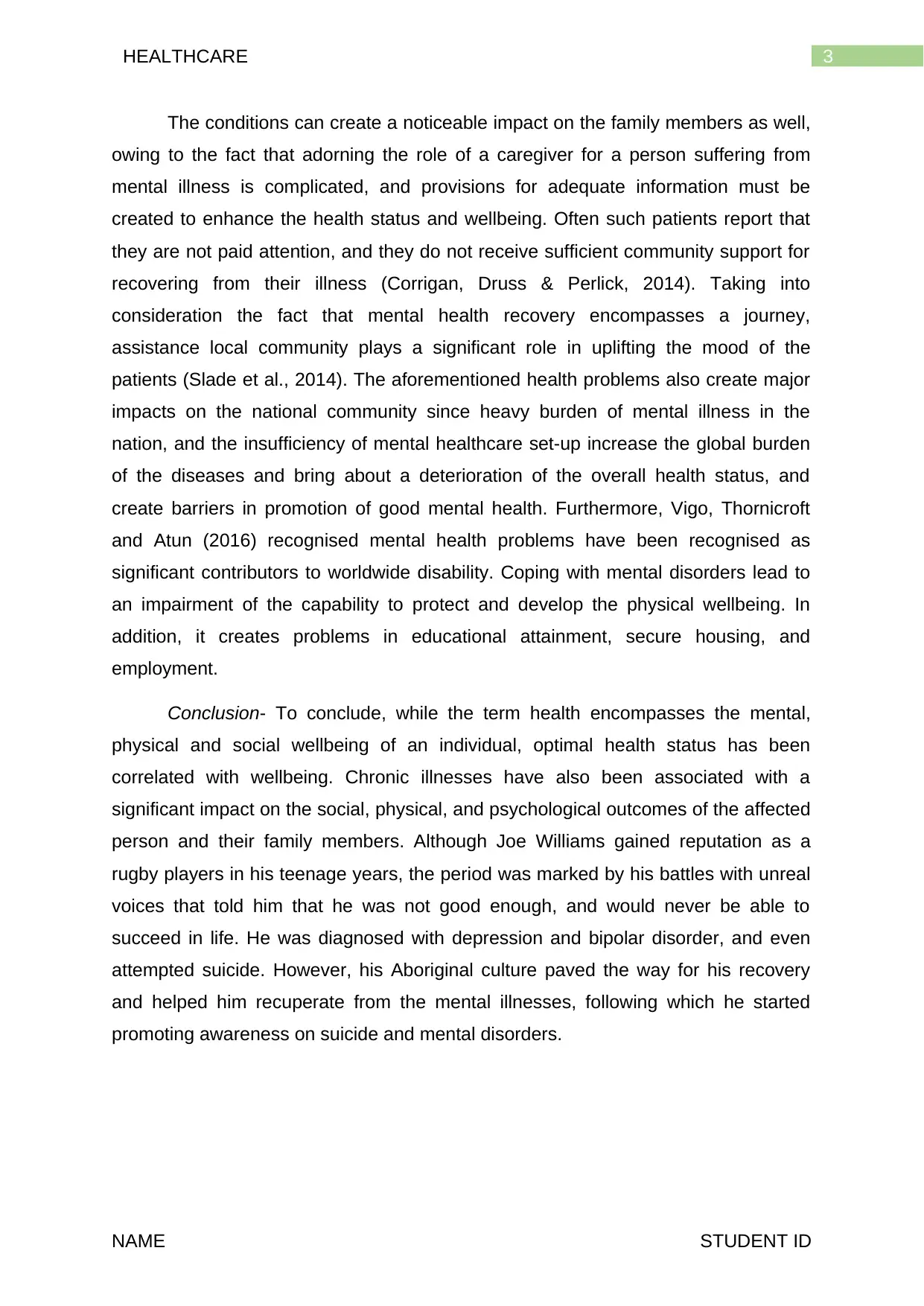
3HEALTHCARE
The conditions can create a noticeable impact on the family members as well,
owing to the fact that adorning the role of a caregiver for a person suffering from
mental illness is complicated, and provisions for adequate information must be
created to enhance the health status and wellbeing. Often such patients report that
they are not paid attention, and they do not receive sufficient community support for
recovering from their illness (Corrigan, Druss & Perlick, 2014). Taking into
consideration the fact that mental health recovery encompasses a journey,
assistance local community plays a significant role in uplifting the mood of the
patients (Slade et al., 2014). The aforementioned health problems also create major
impacts on the national community since heavy burden of mental illness in the
nation, and the insufficiency of mental healthcare set-up increase the global burden
of the diseases and bring about a deterioration of the overall health status, and
create barriers in promotion of good mental health. Furthermore, Vigo, Thornicroft
and Atun (2016) recognised mental health problems have been recognised as
significant contributors to worldwide disability. Coping with mental disorders lead to
an impairment of the capability to protect and develop the physical wellbeing. In
addition, it creates problems in educational attainment, secure housing, and
employment.
Conclusion- To conclude, while the term health encompasses the mental,
physical and social wellbeing of an individual, optimal health status has been
correlated with wellbeing. Chronic illnesses have also been associated with a
significant impact on the social, physical, and psychological outcomes of the affected
person and their family members. Although Joe Williams gained reputation as a
rugby players in his teenage years, the period was marked by his battles with unreal
voices that told him that he was not good enough, and would never be able to
succeed in life. He was diagnosed with depression and bipolar disorder, and even
attempted suicide. However, his Aboriginal culture paved the way for his recovery
and helped him recuperate from the mental illnesses, following which he started
promoting awareness on suicide and mental disorders.
NAME STUDENT ID
The conditions can create a noticeable impact on the family members as well,
owing to the fact that adorning the role of a caregiver for a person suffering from
mental illness is complicated, and provisions for adequate information must be
created to enhance the health status and wellbeing. Often such patients report that
they are not paid attention, and they do not receive sufficient community support for
recovering from their illness (Corrigan, Druss & Perlick, 2014). Taking into
consideration the fact that mental health recovery encompasses a journey,
assistance local community plays a significant role in uplifting the mood of the
patients (Slade et al., 2014). The aforementioned health problems also create major
impacts on the national community since heavy burden of mental illness in the
nation, and the insufficiency of mental healthcare set-up increase the global burden
of the diseases and bring about a deterioration of the overall health status, and
create barriers in promotion of good mental health. Furthermore, Vigo, Thornicroft
and Atun (2016) recognised mental health problems have been recognised as
significant contributors to worldwide disability. Coping with mental disorders lead to
an impairment of the capability to protect and develop the physical wellbeing. In
addition, it creates problems in educational attainment, secure housing, and
employment.
Conclusion- To conclude, while the term health encompasses the mental,
physical and social wellbeing of an individual, optimal health status has been
correlated with wellbeing. Chronic illnesses have also been associated with a
significant impact on the social, physical, and psychological outcomes of the affected
person and their family members. Although Joe Williams gained reputation as a
rugby players in his teenage years, the period was marked by his battles with unreal
voices that told him that he was not good enough, and would never be able to
succeed in life. He was diagnosed with depression and bipolar disorder, and even
attempted suicide. However, his Aboriginal culture paved the way for his recovery
and helped him recuperate from the mental illnesses, following which he started
promoting awareness on suicide and mental disorders.
NAME STUDENT ID
Paraphrase This Document
Need a fresh take? Get an instant paraphrase of this document with our AI Paraphraser
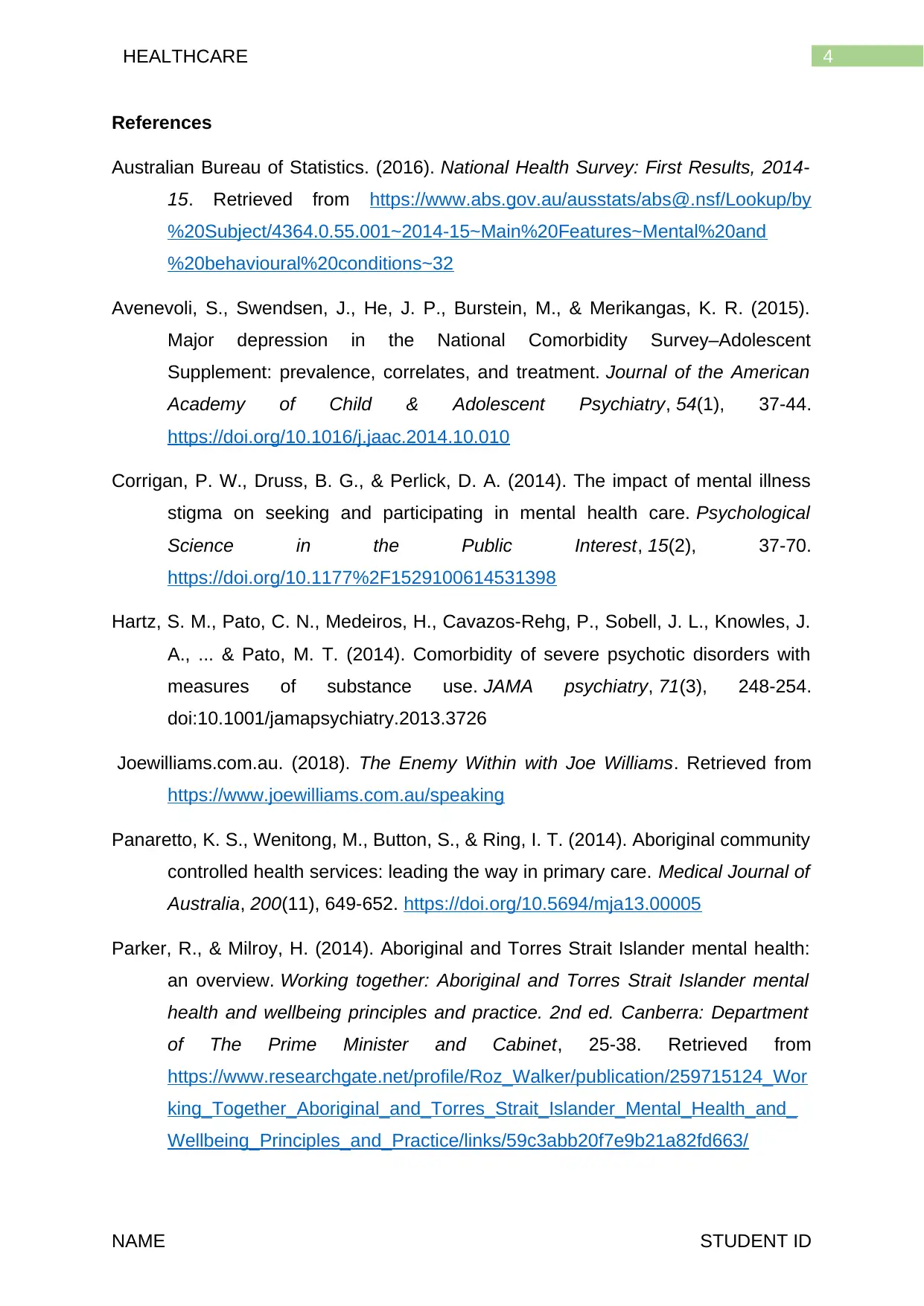
4HEALTHCARE
References
Australian Bureau of Statistics. (2016). National Health Survey: First Results, 2014-
15. Retrieved from https://www.abs.gov.au/ausstats/abs@.nsf/Lookup/by
%20Subject/4364.0.55.001~2014-15~Main%20Features~Mental%20and
%20behavioural%20conditions~32
Avenevoli, S., Swendsen, J., He, J. P., Burstein, M., & Merikangas, K. R. (2015).
Major depression in the National Comorbidity Survey–Adolescent
Supplement: prevalence, correlates, and treatment. Journal of the American
Academy of Child & Adolescent Psychiatry, 54(1), 37-44.
https://doi.org/10.1016/j.jaac.2014.10.010
Corrigan, P. W., Druss, B. G., & Perlick, D. A. (2014). The impact of mental illness
stigma on seeking and participating in mental health care. Psychological
Science in the Public Interest, 15(2), 37-70.
https://doi.org/10.1177%2F1529100614531398
Hartz, S. M., Pato, C. N., Medeiros, H., Cavazos-Rehg, P., Sobell, J. L., Knowles, J.
A., ... & Pato, M. T. (2014). Comorbidity of severe psychotic disorders with
measures of substance use. JAMA psychiatry, 71(3), 248-254.
doi:10.1001/jamapsychiatry.2013.3726
Joewilliams.com.au. (2018). The Enemy Within with Joe Williams. Retrieved from
https://www.joewilliams.com.au/speaking
Panaretto, K. S., Wenitong, M., Button, S., & Ring, I. T. (2014). Aboriginal community
controlled health services: leading the way in primary care. Medical Journal of
Australia, 200(11), 649-652. https://doi.org/10.5694/mja13.00005
Parker, R., & Milroy, H. (2014). Aboriginal and Torres Strait Islander mental health:
an overview. Working together: Aboriginal and Torres Strait Islander mental
health and wellbeing principles and practice. 2nd ed. Canberra: Department
of The Prime Minister and Cabinet, 25-38. Retrieved from
https://www.researchgate.net/profile/Roz_Walker/publication/259715124_Wor
king_Together_Aboriginal_and_Torres_Strait_Islander_Mental_Health_and_
Wellbeing_Principles_and_Practice/links/59c3abb20f7e9b21a82fd663/
NAME STUDENT ID
References
Australian Bureau of Statistics. (2016). National Health Survey: First Results, 2014-
15. Retrieved from https://www.abs.gov.au/ausstats/abs@.nsf/Lookup/by
%20Subject/4364.0.55.001~2014-15~Main%20Features~Mental%20and
%20behavioural%20conditions~32
Avenevoli, S., Swendsen, J., He, J. P., Burstein, M., & Merikangas, K. R. (2015).
Major depression in the National Comorbidity Survey–Adolescent
Supplement: prevalence, correlates, and treatment. Journal of the American
Academy of Child & Adolescent Psychiatry, 54(1), 37-44.
https://doi.org/10.1016/j.jaac.2014.10.010
Corrigan, P. W., Druss, B. G., & Perlick, D. A. (2014). The impact of mental illness
stigma on seeking and participating in mental health care. Psychological
Science in the Public Interest, 15(2), 37-70.
https://doi.org/10.1177%2F1529100614531398
Hartz, S. M., Pato, C. N., Medeiros, H., Cavazos-Rehg, P., Sobell, J. L., Knowles, J.
A., ... & Pato, M. T. (2014). Comorbidity of severe psychotic disorders with
measures of substance use. JAMA psychiatry, 71(3), 248-254.
doi:10.1001/jamapsychiatry.2013.3726
Joewilliams.com.au. (2018). The Enemy Within with Joe Williams. Retrieved from
https://www.joewilliams.com.au/speaking
Panaretto, K. S., Wenitong, M., Button, S., & Ring, I. T. (2014). Aboriginal community
controlled health services: leading the way in primary care. Medical Journal of
Australia, 200(11), 649-652. https://doi.org/10.5694/mja13.00005
Parker, R., & Milroy, H. (2014). Aboriginal and Torres Strait Islander mental health:
an overview. Working together: Aboriginal and Torres Strait Islander mental
health and wellbeing principles and practice. 2nd ed. Canberra: Department
of The Prime Minister and Cabinet, 25-38. Retrieved from
https://www.researchgate.net/profile/Roz_Walker/publication/259715124_Wor
king_Together_Aboriginal_and_Torres_Strait_Islander_Mental_Health_and_
Wellbeing_Principles_and_Practice/links/59c3abb20f7e9b21a82fd663/
NAME STUDENT ID
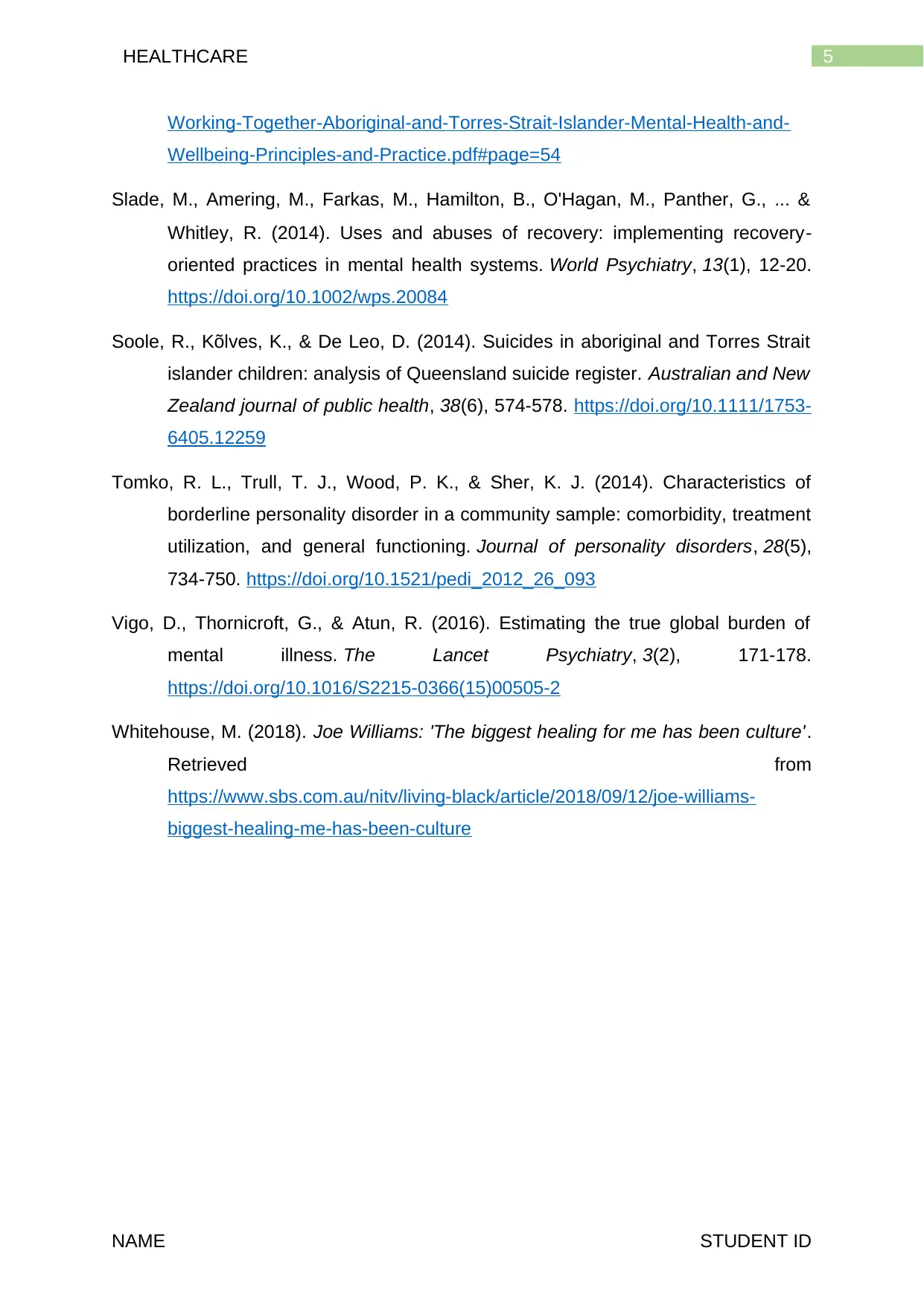
5HEALTHCARE
Working-Together-Aboriginal-and-Torres-Strait-Islander-Mental-Health-and-
Wellbeing-Principles-and-Practice.pdf#page=54
Slade, M., Amering, M., Farkas, M., Hamilton, B., O'Hagan, M., Panther, G., ... &
Whitley, R. (2014). Uses and abuses of recovery: implementing recovery‐
oriented practices in mental health systems. World Psychiatry, 13(1), 12-20.
https://doi.org/10.1002/wps.20084
Soole, R., Kõlves, K., & De Leo, D. (2014). Suicides in aboriginal and Torres Strait
islander children: analysis of Queensland suicide register. Australian and New
Zealand journal of public health, 38(6), 574-578. https://doi.org/10.1111/1753-
6405.12259
Tomko, R. L., Trull, T. J., Wood, P. K., & Sher, K. J. (2014). Characteristics of
borderline personality disorder in a community sample: comorbidity, treatment
utilization, and general functioning. Journal of personality disorders, 28(5),
734-750. https://doi.org/10.1521/pedi_2012_26_093
Vigo, D., Thornicroft, G., & Atun, R. (2016). Estimating the true global burden of
mental illness. The Lancet Psychiatry, 3(2), 171-178.
https://doi.org/10.1016/S2215-0366(15)00505-2
Whitehouse, M. (2018). Joe Williams: 'The biggest healing for me has been culture'.
Retrieved from
https://www.sbs.com.au/nitv/living-black/article/2018/09/12/joe-williams-
biggest-healing-me-has-been-culture
NAME STUDENT ID
Working-Together-Aboriginal-and-Torres-Strait-Islander-Mental-Health-and-
Wellbeing-Principles-and-Practice.pdf#page=54
Slade, M., Amering, M., Farkas, M., Hamilton, B., O'Hagan, M., Panther, G., ... &
Whitley, R. (2014). Uses and abuses of recovery: implementing recovery‐
oriented practices in mental health systems. World Psychiatry, 13(1), 12-20.
https://doi.org/10.1002/wps.20084
Soole, R., Kõlves, K., & De Leo, D. (2014). Suicides in aboriginal and Torres Strait
islander children: analysis of Queensland suicide register. Australian and New
Zealand journal of public health, 38(6), 574-578. https://doi.org/10.1111/1753-
6405.12259
Tomko, R. L., Trull, T. J., Wood, P. K., & Sher, K. J. (2014). Characteristics of
borderline personality disorder in a community sample: comorbidity, treatment
utilization, and general functioning. Journal of personality disorders, 28(5),
734-750. https://doi.org/10.1521/pedi_2012_26_093
Vigo, D., Thornicroft, G., & Atun, R. (2016). Estimating the true global burden of
mental illness. The Lancet Psychiatry, 3(2), 171-178.
https://doi.org/10.1016/S2215-0366(15)00505-2
Whitehouse, M. (2018). Joe Williams: 'The biggest healing for me has been culture'.
Retrieved from
https://www.sbs.com.au/nitv/living-black/article/2018/09/12/joe-williams-
biggest-healing-me-has-been-culture
NAME STUDENT ID
⊘ This is a preview!⊘
Do you want full access?
Subscribe today to unlock all pages.

Trusted by 1+ million students worldwide
1 out of 6
Your All-in-One AI-Powered Toolkit for Academic Success.
+13062052269
info@desklib.com
Available 24*7 on WhatsApp / Email
![[object Object]](/_next/static/media/star-bottom.7253800d.svg)
Unlock your academic potential
Copyright © 2020–2026 A2Z Services. All Rights Reserved. Developed and managed by ZUCOL.
